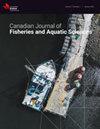Hybrid choice modeling offers an interdisciplinary perspective on angler preferences for the future
IF 2.2
2区 农林科学
Q2 FISHERIES
Canadian Journal of Fisheries and Aquatic Sciences
Pub Date : 2024-04-29
DOI:10.1139/cjfas-2023-0280
引用次数: 0
Abstract
Canadian Journal of Fisheries and Aquatic Sciences, Ahead of Print.Angler decisions are shaped by an interplay between “internal” psychological processes and “external” institutional factors that are equally important yet often evaluated in isolation. We therefore developed a hybrid choice model whereby a structural equation model of behavioral antecedents was integrated with a discrete choice experiment to evaluate competing preferences for fisheries management scenarios across the Great Lakes region. We observed that preferences for native fish populations, invasive species impacts, wash station availability, habitat quality, and added cost per fishing trip were rooted in nature-based (i.e., biospheric), human-focused (i.e., altruistic) and self-driven (i.e., egoistic) values. Specifically, preferences for reduced invasive species impacts were more pronounced among anglers with stronger altruistic values, and less pronounced among those with strong egoistic values. Preferences also varied by fishing mode, in that boaters were more sensitive to cost than shoreline or mixed mode users, and younger anglers were more open to change. This study showcases a novel interdisciplinary methodological approach that builds more complete knowledge of the interrelationships between psychological and institutional factors that underpin angler decision-making.
混合选择模型为垂钓者的未来偏好提供了跨学科视角
加拿大渔业和水产科学杂志》,提前印刷。 垂钓者的决策是由 "内部 "心理过程和 "外部 "制度因素之间的相互作用形成的,这些因素同样重要,但往往被孤立地评估。因此,我们开发了一个混合选择模型,将行为前因的结构方程模型与离散选择实验相结合,以评估五大湖区渔业管理方案的竞争偏好。我们观察到,对本地鱼类种群、入侵物种影响、冲洗站可用性、栖息地质量和每次出海捕鱼的额外成本的偏好根植于基于自然(即生物圈)、以人为本(即利他)和自我驱动(即利己)的价值观。具体而言,利他主义价值观较强的垂钓者对减少入侵物种影响的偏好更为明显,而利己主义价值观较强的垂钓者对减少入侵物种影响的偏好则不太明显。不同垂钓方式的偏好也有所不同,船钓者对成本的敏感度高于岸上或混合垂钓方式的使用者,而年轻垂钓者对变化的接受度更高。这项研究展示了一种新颖的跨学科方法论,可以更全面地了解支撑垂钓者决策的心理和制度因素之间的相互关系。
本文章由计算机程序翻译,如有差异,请以英文原文为准。
求助全文
约1分钟内获得全文
求助全文
来源期刊

Canadian Journal of Fisheries and Aquatic Sciences
农林科学-海洋与淡水生物学
CiteScore
4.60
自引率
12.50%
发文量
148
审稿时长
6-16 weeks
期刊介绍:
The Canadian Journal of Fisheries and Aquatic Sciences is the primary publishing vehicle for the multidisciplinary field of aquatic sciences. It publishes perspectives (syntheses, critiques, and re-evaluations), discussions (comments and replies), articles, and rapid communications, relating to current research on -omics, cells, organisms, populations, ecosystems, or processes that affect aquatic systems. The journal seeks to amplify, modify, question, or redirect accumulated knowledge in the field of fisheries and aquatic science.
 求助内容:
求助内容: 应助结果提醒方式:
应助结果提醒方式:


